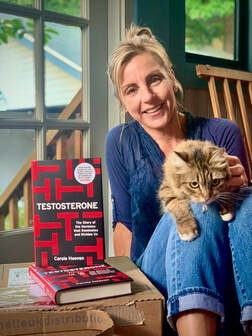
Recent work: Free Press article on why I left Harvard Opinion in NYT about "sex assigned at birth" Quillette piece about sex differences in chess Podcast with Andrew Sullivan I am a human evolutionary biologist, author, and award-winning educator. I am a nonresident senior fellow at the American Enterprise Institute, where I work on issues related to sex and gender, health, psychology, and academic freedom in higher education. I am an associate in Harvard’s Department of Psychology, in the lab of Steven Pinker, and am an active member of the newly established Council on Academic Freedom at Harvard. I hold a PhD in Biological Anthropology from Harvard University and a BA in psychology from Antioch College. I am the author of the book T: The Story of Testosterone, the Hormone That Dominates and Divides Us (Henry Holt, 2021) which the Wall Street Journal described as “Clear-eyed and crisply written… a gorgeous culmination of an odyssey both professional and personal.” I am working on a new book about how an understanding of the science of sex can smooth boys’ transition through adolescence to manhood. Since T was published in the summer of 2021, I've been involved in some strong disagreements about language in science education and academic freedom. I recently published an article about my experiences in the Free Press, and another one in the Archives of Sexual Behavior. Also see this commentary by Harry Lewis, Harvard professor of Computer Science, and this by Jerry Coyne, Emeritus professor of Ecology and Evolution at the University of Chicago. As a result of the lack of support from Harvard for my right to express my scientific views in an environment free of harassment, in January '23 I retired from my long-term teaching and administrative job at Harvard. At that time I moved to an (unpaid) associate position in Harvard's Psychology department. I started my position as a non-resident senior fellow at the American Enterprise Institute in July of '23. I love my new positions but I miss teaching and my students every day. My research, writing and teaching (mostly at Harvard in the department of Human Evolutionary Biology for over two decades) focuses on behavioral endocrinology—the relationship among hormones, brain, behavior and environment in humans and other animals. I am particularly interested the role of evolution in the intricate interplay between biology and culture, and how this helps to explain sex differences in areas such as in play, education, crime, parenting, and mating strategies. I am also a public advocate for free speech and evidence-based social, educational, and legal policies concerning sex and gender. My many television, radio, and podcast appearances include BBC News, Fox & Friends, Dr. Phil, and The Joe Rogan Experience, and my work has been featured in outlets such as the Wall Street Journal and the New York Times. My work has also been published in academic journals, including Hormones and Behavior, Neuropsychologia, and Archives of Sexual Behavior. I live in Cambridge, Massachusetts with my husband Alex, son Griffin and cat Lola. I love watching birds, running and biking, Belgian beer, salty snacks and freedom of speech. You can find me on Twitter at @hoovlet, and I'll figure out Instagram and start posting more at carole.hooven. How I got to Harvard bio, starting with an excerpt from Chapter 1 of T: My journey to Uganda wasn’t exactly a straight line. An interest in human behavior drove me to major in psychology in college. I enjoyed classes like Freud and Jung, Abnormal Psychology, and Personality and Individual Differences. But it wasn’t until my senior year that I had to restrain myself from jumping out of my seat, barely able to contain my excitement about the lecture material. I will never forget that course (Biological Psychology), the professor (Josephine Wilson), and the day she introduced me to neurons and neurotransmitters and how their actions and levels affect all kinds of behavior. I remember her standing tall, raising her outstretched arms above her head, and wiggling her fingers around to bring a neuron and its dendrites—little branches that communicate with other neurons—to life. A new, powerful way to understand the origins of behavior was opening up for me, and it felt tremendously satisfying. I knew I wanted more of that feeling, but graduation loomed and I had no job. These experiences intensified my desire to find the deepest, most powerful explanations for human behavior and converged on one question: how has evolution shaped human nature? Then I read the book that suggested a path I could take to pursue my questions: Demonic Males: Apes and the Origins of Human Violence. It wasn’t violence, specifically, that drew me in; it was the approach that the two authors used to investigate large questions about how we got to be the way we are. I decided that I wanted to do what the lead author [Richard Wrangham] did, which was to study chimpanzees to learn more about ourselves and our evolutionary origins. So I quit my job and applied to graduate school. I do not recommend doing things in that order. And that’s how I found myself in the forest on that January day in 1999, catching chimp urine and watching a big male beat up a smaller female while she tried to protect her kids. Their interaction had dramatically exemplified the contrasting patterns of chimp behavior that had already captivated my interest—relatively peaceful, nurturing females and sex-and hierarchy-obsessed aggressive males. The experience of observing wild chimpanzees in Uganda solidified my desire to research the biological basis of human sex differences. It was obvious to me that culture is only part of the explanation. I began my PhD at Harvard in the fall of 1999, defended my dissertation (on testosterone and sex differences in spatial ability) in 2004, and stayed at Harvard to teach and advise undergrads in Human Evolutionary Biology. I stayed on until January 2023, when I felt I could no longer carry out my professional responsibilities. |